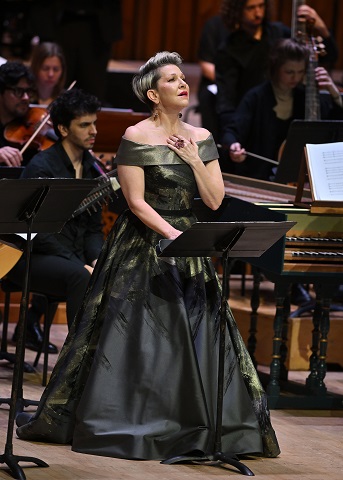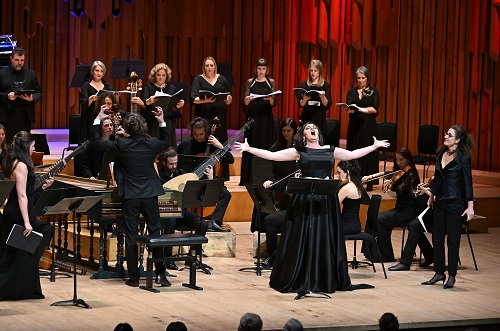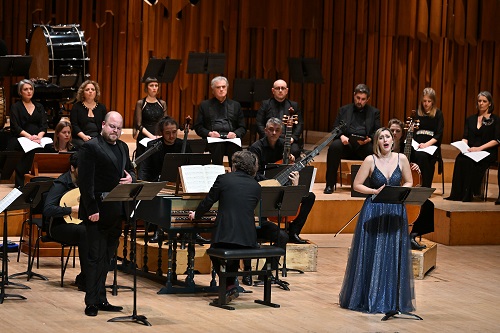It was clear which ‘queen’ the capacity audience at the Barbican had come to see, and it wasn’t the tragic Queen of Carthage whose downfall and death are brought about by the weakness of a Trojan ‘hero’. This concert performance of Purcell’s Dido and Aeneas was a London stop-over on Il Pomo d’Oro’s European tour, but it was effectively billed as DiDonato sings Dido and from the moment the American soprano walked onto the Barbican stage one could feel the anticipation and excitement rise.
I’m not sure that it was appropriate for Joyce DiDonato to indulge in a nod and quick smile to acknowledge the fervent welcome she received – it might have lessened the regality of the persona she was about to embody – but once Purcell’s opera was underway her focus and intensity were consummate. The complaints of Dido’s first aria, when she tells her companion, Belinda, that she is “pressed in torment” were wonderfully shaped, delicate but fervent, and supported by tender theorbo musings. The closing repetitions, “I languish till my grief is known,/ Yet would not have it guessed”, created a sense of the queen’s distance from her court, of the disassociation that her grief brings.
Later there was fury and ferocity, when Dido learns of Aeneas’s betrayal. She fairly flung the imperious command, “Away, away”, at the dithering Trojan. The famed lament was the epitome of tragic poise, though. Singing with heart-touching poignancy, Dido/DiDonato held the entire audience, her court, transfixed, an effect intensified by the dimming of the Hall lighting in the chorus’s final commentary – sung with beautiful nuance and oneness by the newly formed Il Pomo d’Oro Chorus – leaving Dido spot-lit centre-stage, alone.

This wasn’t a one-woman show though, by any means. His tenor bright and clear, Andrew Staples managed to make Aeneas seem less spineless than is often the case, while soprano Fatma Said was a luminous Belinda, vibrant and dramatic in her exchanges with the two lovers, and blending with glowing euphony with Carlotta Colombo’s Second Woman. Beth Taylor’s Sorceress was wonderfully over-the-top, relishing the melodrama, and partnered by two gleefully wicked Enchantresses, Alena Dantcheva and Anna Piroli. As the Spirit sent by Jove to remind Aeneas of his duties to Rome, countertenor Hugh Cutting made a splendidly theatrical entrance and sang with beguiling power and sweetness: no wonder Aeneas determined to heed the god’s command.
Conducting from the harpsichord, Maxim Emelyanychev was a veritable human dynamo, galvanising his musicians and singers with tremendous verve and imagination. Tempi were swift, but the drama never felt rushed. Additional percussion infused the choral numbers with verve and spirit, and announced – along with demonic red lighting – the Sorceress’s arrival with quasi pantomime-esque bravura. Massimo Altieri was a persuasive sailor. The chorus leapt about as witches and hopped about as the ship’s crew. Instrumentalists moved around the platform to create echo effects. Concert performance this may have been, but nothing was still, until Dido’s final lament.

Another lament had closed the first half of the evening, the final choric hymn, ‘Plorate fili Israel’ of Giacomo Carissimi’s sacred narrative, Jephte, which weaves its funereal mourning to close this oratorium latinum. Composed about forty years before Purcell’s opera, it’s another work in which a man’s intemperate actions cause the downfall and death of a woman whom he loves. The composer termed these oratorios, that were so enjoyed by the Catholic elite during the Counter-Reformation, historiæ, and they tell their biblical stories with succinctness and cohesiveness.
Jephte of the Hebrew leader who, in return for the Lord’s aid in his war against the Ammonites, vows to sacrifice the first thing that he encountered after the victory granted him, only to find, to his horror, that this is his beloved daughter. Carissimi’s libretto is faithful to the biblical text: Jephte’s daughter accepts her fate but beseeches her father to allow her to go to the mountains for two months to weep over her virginity.

These biblical historiæ were probably performed in intimate chapels, with a single performer to each part and continuo accompaniment. The Barbican Hall is a large space to fill though, and here we had a chorus of eighteen and an instrumental group comprising seven string players, two theorbos, organ and harpsichord. The baroque spirit of the work was respected though. There were lovely colours and textures, with especially expressive playing by the viola da gambas adding to the poignancy. Well-blended choral singing was shaped sensitively by Emelyanychev to emphasise the harmonic twists and turns which convey Jephte’s suffering.
Jepthe is essentially an ensemble work, the music moving from recitative to arioso and aria, and the narrative unfolding through the contributions of various singers. It was good to have the opportunity to hear individual members of the Il Pomo d’Oro Chorus. They articulated the text with clarity and expressive care, and had no difficulty negotiating the sometimes florid vocal lines. Staples was a distinguished Jephte, conveying the conflicting passions of the rash but regal warrior with discerning use of vocal colour and weight. As his selfless daughter, Colombo sang with beautiful solemnity.
It was, however, Dido’s plea, “Remember me”, that was the lingering lament of this splendid musical evening.
Claire Seymour
Giacomo Carissimi – Jephte; Henry Purcell – Dido and Aeneas
Il Pomo d’Oro, Maxim Emelyanychev (conductor)
Andrew Staples – Jephte and Aeneas, Carlotta Colombo – Figlia and Second Woman, Joyce DiDonato – Dido, Fatma Said – Belinda, Beth Taylor – Sorceress, Hugh Cutting – Spirit, Massimo Altieri – Sailor, Alena Dantcheva – First Enchantress, Anna Piroli – Second Enchantress, Il Pomo d’Oro Choir
Barbican Hall, London; Friday 2nd February 2024.